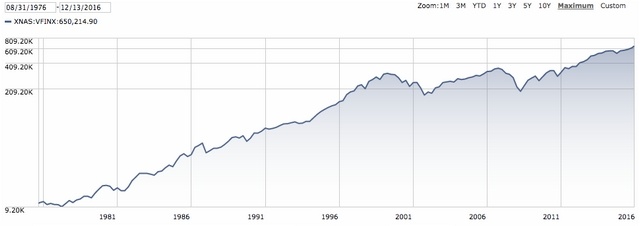

[Estimated time to read: 3 minutes]
As I’m writing this the S&P 500 is up, the FTSE is up, the DAX is up…
Predictions of a Trump win devastating the economic landscape have failed to come to fruition.
So you’d think investor sentiment would be ebullient…but it’s not.
Doom, gloom, hype and fear
![]() Read market news or listen to stock picking pundits on the telly, and all you’ll hear is new negativity…
Read market news or listen to stock picking pundits on the telly, and all you’ll hear is new negativity…
Trump’s bullying tweets and threatening political appointments will crash the markets in 2017, apparently…

So, while your portfolio’s value is riding the crest of the wave, and before the seemingly inevitable crash that the market forecasters say is coming, surely it’s the best time to sell and get out, right?
This is the question Millionaire Teacher author Andrew Hallam poses in his latest blog, which we have his permission to share.
Andrew writes:
“I started to invest at a market peak. It was 1989. The S&P 500 had never been higher. It had gained more than 30 percent that year.
“If I had known that, I might have done something foolish. Forecasters said stocks might jitter when U.S. troops invaded Panama.
“It was an unpredictable time. They said the same thing when the U.S. shot down two Libyan fighters over the Mediterranean Sea.
“It was an unpredictable time. Nobody told me that the massacre at The Tiananmen Square might hurt my portfolio. It was an unpredictable time.
“But no point in history has ever been predictable.
“Stocks will crash. Bonds will fall. Stocks will rise. Bonds will soar. That’s what markets do.
Many pull out of the markets when fear and greed trip them up…
“But when it comes to investing, just cover your eyes and ears. Someone investing $10,000 a year into an S&P 500 index fund from January 1989 to November 30, 2016 would have grown that money to $1.38 million–if they ignored market headlines.”

Source: Andrew Hallam
Nothing else matters more
As we leave a year of political surprises behind, and cross the threshold into a new year of unpredictability, Andrew’s advice is clear:
Don’t listen or react to market noise: as John Denver sang: “who cares what the morrow will bring!”
Time in the market is what counts - not trying to time it – nothing else matters more.
Let’s turn back to Andrew for the evidence that proves why:
“Between 1963 and 1993 the stock market was open during 7,802 days.
“University of Michigan Professor H. Nejat Seyhun found that during that period, 95 percent of the stock market’s gains came from just 90 of those 7,802 days.
“That was pretty normal. The S&P 500 averaged 9.85 percent per year between January 1995 and December 31, 2014.
“That would have turned $10,000 into $65,475.
“Investors who missed the best five stock market days would have averaged just 7.62 percent per year.
“Instead of seeing their money grow to $65,475, they would have ended up with $43,435.
“By missing the best 20 days, this money would have grown to just $20,360. Investors unlucky enough to be out of the markets for the best 40 days would have lost money.
“Their initial $10,000 would have shrunk to $9,143.”

3 ways to make 2017 more profitable – no matter what
- Consider establishing a well-diversified portfolio of low cost index funds and adding to it every month.
- Because investing is not speculating, don’t listen to the news, and certainly don’t react to it.
Statistically speaking, you’re unlikely to time the market right no matter how hard you try – and you’ll be more profitable over the long-term if you leave your passive portfolio invested.
- Get any savings, investments and pensions you already have reviewed.
If you can cut costs and improve returns, we’ll show you how for free.
Andrew Hallam deserves the final word:
“[Your portfolio] will rise. It will fall. But over your lifetime, the portfolio should excel if you can keep it invested. And if you’re working, keep adding money.”
Happy New Year to all our regular readers.
Let’s follow the evidence and make 2017 the best yet.

